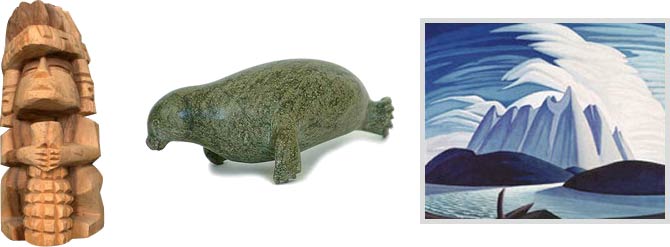| Challenges and Opportunities | Focus on Tomorrow |
Careers In Culture
Heritage - What You Need to Know
Challenges and Opportunities
Storytellers on the front line
In Search of a Self
Our country is a made up of many different communities, and each person's heritage contributes to what it means to be Canadian. It's our combined heritages that give Canada its identity. Can you imagine trying to keep track of Canada's past? People in careers in heritage try to do just that. You could become a genealogist helping people retrace their roots, a software developer creating a virtual exhibition, or a musician playing the traditional music of your ancestors. Each person adds to what it means to be Canadian.

Be a Heritage Detective
Are you naturally curious? Do you like to follow clues and unravel mysteries, and find the story "behind" the story? Do you wonder why something was built, written, drawn or crafted in a particular way? People who work in heritage act like detectives. They follow in the footsteps of those who have gone before, tracking or keeping alive some aspect of our Canadian identity. They discover our past stories, collect our records and knowledge, and safeguard our history to make sure it gets told. You might be an archivist working on digitizing a collection, an historian providing the background for an exhibit, a conservation architect adapting an historic building for office space, or a music anthropologist researching the songs of new Canadians. Consider a career in heritage and leave your mark on the future.
Heritage Sells
Some people believe that looking into the past is a waste of time. After all, what does an old building have to do with today? If that's what you think, then think again. Heritage has a value in today's world. Have you noticed how often heritage is used to sell products? In a TV commercial, a car manufacturer uses classical music to promote its vehicles. A designer creates a new line of clothing based on the style of a previous era. A billboard features a bank that is marketing its financial services against the backdrop of an historic streetscape. Heritage is powerful in our commercial marketplace because it provides a feeling of stability and quality to modern products. What does this mean for people interested in heritage? That many diverse career paths are connected to heritage.
Heritage Online
The Internet and the digitization of information have revolutionized the heritage industry. Collections that have been tucked away in archives and museums can be made available online to Canadians and the world. How do we protect electronic data, often created by different people using different technologies? How do we meet the needs of a voracious information-driven society, while ensuring a stable and safe storage and retrieval system? What will happen to the records we are digitizing today? Will they be accessible in 10, 50 or 100 years time? The heritage industry needs skilled new technology and information professionals – digitizers, programmers, records specialists, website developers, webmasters and scriptwriters – who can ensure that the virtual products we are creating today will be accessible to future generations.

Create Your Niche
Carving out your niche means looking at what you do well and seeing what hasn't been done before, combine the two and create your own career. People who carve out the best niches have vision. They create and sell a concept or product to an audience that needs it. For example, the Historica Foundation of Canada wanted to actively engage young people so they set up a School Fairs program. That's finding a niche and making it happen. It takes a lot of courage to be the first to venture into new frontiers. Are you a risk-taker? Do you have new ideas? Do you thrive on doing things that haven't been done before? Then go for it. The heritage world needs you!
Build Your Heritage Business
Contract work – being hired for a period of time to complete a specific project – is a big trend in the heritage field. Museums, archives, libraries, and government departments and agencies often hire self-employed professionals to provide specialized services. For example, a heritage organization might contract a researcher to complete a listing of heritage activities in their community, or a museum may work with a digital media specialist to create a virtual exhibit. If you work in the heritage field as a consultant, you'll be running a small business. Think about building your marketing and business skills. They'll be crucial to your success.